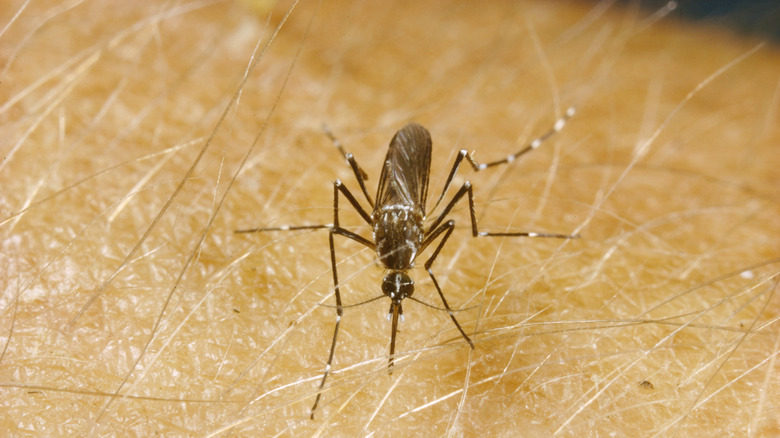This Unexpected Herb Is The Mosquito-Fighting Secret Weapon You'll Always Want To Have On Hand
Having a home herb garden can yield numerous benefits, including ingredients for everything from recipes to lotions and soaps. Mint is easily one of the most versatile plants you can keep around, especially because it can help keep away pests, especially mosquitos, which cause irritation and bites. If you've ever suffered from these annoying insects, keeping mint herbs on hand will help deter them and keep you bug-bite-free.
Mint gives off a very strong scent, which many humans find pleasing, but mosquitos seem to detest. The aroma this herb emits can cause these bugs to lose their sense of smell, creating a "nose blindness" effect that deters them from biting and hanging out around people. It basically masks you to their otherwise keen sense of smell, so you can enjoy yourself indoors or out even if they are around. You have several options once you've obtained or grown this herb, all of which will help protect you from mosquito bites.
Using mint to repel mosquitos
If your home suffers from constant mosquito visits, mint is a great addition to your personal herb garden and will provide you with a defense against them. It does best when grown in zones 3 to 8, and you can keep this plant both indoors or on a porch or patio in a pot. By keeping mint inside or in the close vicinity of your house, mosquitos will be less compelled to gravitate toward it, thanks to their aversion to the scent.
Results can vary when using mint to keep mosquitos at bay, but overall, people have found that crushing the leaves to make an essential oil stops pests from landing or biting, and the effects can last over 6 hours. To make essential oil from your mint herb leaves, you can wash and grind them up to release the moisture and mint essence in a jar. Directions vary according to different social media videos, but using a neutral oil like olive or avocado oil is recommended. Fill the jar of peppermint leaves with 1/2 cup or more of oil (this can be as much as the remainder of the jar if you prefer). Shake well and leave the mixture to soak together for two to six weeks. Label the lid so you can keep track of when it was made and when it will be ready. This can then be used as a balm or salve that you apply to keep mosquitos from hanging around.
Caveats of using mint to repel mosquitos
Not all species of mint are safe for this purpose, and it is important to avoid using those that can be dangerous for human consumption. Mosquito Reviews notes that Mentha Pulegium is one example of mint to avoid because it is known to be toxic. Mentha Spicata and Mentha piperita L., also known as spearmint and peppermint, are great options for this trick and are safe for people. Check names and toxin levels before planting to ensure no one gets sick from the type of mint you purchase.
Different species thrive or struggle in different growing regions, so it is imperative to determine what kind of mint will do well where you live. Once settled in an area where it will flourish, mint can grow quickly, which means you will have constant access to your homegrown repellent whenever you need it — especially during mosquito seasons. However, it is known to be an invasive plant, so taking care to trim and harvest it regularly is important to keep the rest of your garden flourishing, too.

